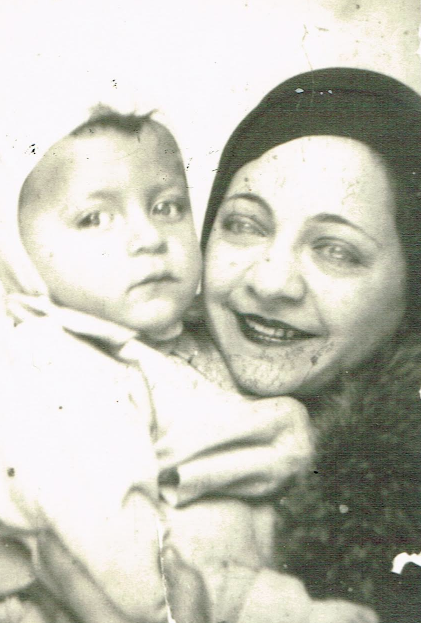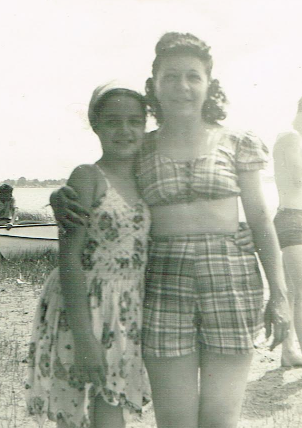
Familial Contempt and Delicious Komish Broyt
My grandmother Tania had nothing but contempt for her mother-in-law, Toibe Breittleman. In Tania’s view, the woman was coarse, vulgar and had questionable morals. My grandfather’s mother did not have it easy. When her husband left Russia in search of the better life promised by the lady with the lamp, Toibe remained behind in their dirt-floored home with three small children to raise. There was a single overcoat that they took turns wearing, and she freely gave the children cigarettes to help stave off the hunger pangs; my grandfather began to smoke, with her blessing, at the age of eight. Her desperation—and resourcefulness—drove her to seek work in hotel where she met friends in higher places—gentlemen, army officers—whom she charmed and entertained in ways that were perhaps not entirely kosher. These men supplied food, money and cigarettes and it was her rumored association with them that followed her to America and made my grandmother decide she was a “loose woman.”

Tania, in shorts, standing with my mother who was about 11 in this photo.
Toibe’s husband died but she managed to get along on her own. She was a mover and shaker in her small community of Detroit Jews; she organized elaborate picnics and charged people to attend; the money she raised was donated to help other immigrants like herself. She dyed and curled her hair, wore make up every day and never went anywhere without high heeled pumps. Her dressing table was filled with glass bottles of scent and aromatic unguents, and a flounced, beribboned boudoir doll sat on her bed. After buying a new dress, she would immediately cut out the neckline to expose a more daring swath of decollatage, and then, as if that weren’t enticement enough, sewed sequins all over the bodice. When Tania, then in her twenties, purchased a rather daring pair of Bermuda shorts, Toibe ran right out and purchased an identical pair of her own.
Privately, my grandmother shuddered in horror. Her mother-in-law was a floozy, pure and simple. And yet she had to acknowledge that Toibe was a something of a magician in the kitchen, known for her cooking and baking—which she did in her trademark high heels. These were skills my grandmother prized and which she had not learned from her own mother, Miriam.
Where Toibe had been literally, dirt poor, Miriam’s life back in Russia had been quite different. Her husband, my maternal great-grandfather, was a tanner, an occupation that was considered revolting—the animal skins were softened with a mixture that contained large quantities of urine. There were many professions to which Russian Jews were denied access but tanning was not one of them, possibly because it was so disgusting few people wanted to do it. My great-grandfather became a successful and wealthy man, and my grandmother, the second youngest of twenty-two children (Miriam was possessed of a Biblical fertility) recalled a fine house with parquet floors, crystal chandeliers, and velvet drapes. There was a piano, on which her older sisters were given lessons, and a room for dancing, for they had those lessons too. Some of her brothers went to a military academy. Miriam did not cook for her enormous family; she had servants for that.
But this life of ease and affluence came to an abrupt and savage end when my great-grandfather left for a business trip from which not he, but his bloodied corpse returned, shrouded in a canvas mail sack. Shocked and grief-stricken, Miriam swallowed poison; my grandmother spoke of the “burns around her mouth.” But Miriam was more resilient than she knew—she did not die. Instead she rallied, intent on bringing the five children remaining at home to America. Then Revolution broke out, making Miriam even more desperate to escape. She left her two tiny daughters—my grandmother was six, her younger sister four—while she went out to sell the contents of her home in order to book passage for the trip; she stood mattresses in front of the windows, many of them now shattered, to keep rocks and stones from being hurled in during her absence. Silver, jewelry, crystal, porcelain—all sold, all gone. She kept only five silver soup spoons, and tucked them deep into the recesses of her bag, where they remained until she reached America.

Tania with my uncle.
The polar opposite of Toibe, Miriam was prim, reserved and modest. Her gray hair was always secured in a neat bun. She wore plain, cloth coats, lace up shoes and unadorned leather handbags in two colors only, navy or black, and white blouses that she periodically boiled on the stove in bleach-laced water. For special occasions, she donned a strand of tiny red coral beads and coral earrings.
Yet my grandmother wanted to learn to cook, and especially bake, and so she had to set aside her disdain and turn to her mother-in-law. And Toibe, who was well aware of her daughter-in-law’s contempt, grudgingly said yes, which was how Toibe came to teach my grandmother to make the crunchy, twice baked cookies that were called komish broyt—almost bread.
My meticulous grandmother was an apt pupil and may have even outdone her teacher. Her cookies, studded with walnuts and raisins, and dusted with cinnamon sugar, were thin, light, crisp and delicious. She made them for all the Jewish holidays, brought them to Shabbos dinners, bris celebrations and shivas. When my mother lived in Israel as a young woman, my grandmother wrapped the cookies individually in tissue paper and packed them in tins that she mailed overseas, where they would arrive safely, with scarcely a cracked one in the batch. She taught my mother to make them, though my mother, more bohemian artist than balbusta, would either cut them too thick, or make what to to my grandmother would have been unthinkable alterations—chocolate chips if she had no raisins, peanuts in lieu of walnuts. These cookies were a staple of my childhood and as a young married woman, I began to bake them too; they quickly became a favorite of my own family.
Miriam is long gone now. So are Toibe and my grandmother Tania. The two women who rarely saw eye to eye were somehow united in the kitchen. The recipe and the silver spoons are their conjoined legacy, all that remains of a vanished world. I’ve given the recipe to my daughter Kate—she is the fifth generation of women in our family to have it—and the spoons will be hers one day too. I hope she’ll bring them along into whatever new life she makes for herself; I’d like to think that the spirits of Toibe and Tania will be watching.
Toibe and Tania’s Komish Broyt
4 cups flour
2 teaspoons baking powder
1/2 teaspoon baking soda
4 eggs
1/2 cup orange juice
1 cup oil
1cup sugar
1 teaspoon vanilla
3/4 cup white raisins, plumped with boiling water for 10 minutes, then drained.
3/4 crushed walnuts
Cinnamon sugar to taste
Mix dry ingredients first; gradually fold in wet ingredients, raisins and nuts. When batter has been blended, refrigerate for 30 minutes. Then use batter to form a loaf in a pan, dust with cinnamon sugar and bake for 30 minutes @ 350 degrees. Let cool entirely and with a serrated knife cut in thin slices and bake again at 325 degrees, turning to brown evenly on both sides. Check often to make sure they do not burn.



